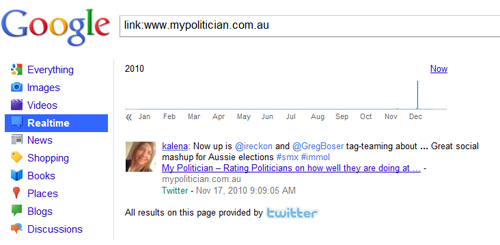Go Social – Social Media Generates Effective Signals That Will Boost Search Engine Rankings

Does your company have a social media presence ? If not, it is time that you should build up one!
Google and Bing has made it clear that social signals are now used as a ranking factor.

Social media signals do had its own priority in search long back as I have been doing extensive research on the same and have come across website like www.mypolitician.com.au which have generated a lot of online buzz through social media and gained benefit from social media. The Australian website discussed about politicians and it gained huge search engine position improvement in-spite of being a new website. The social media signals gave the implication that the website was providing valuable content. Google and other search engine started to rank the website on top for very competing keywords.
It is now official as Google and Bing has send their replies about social media impact on search engine rankings.
Danny Sullivan has done a question and answer session with officials of both search engine. Below are the response from search giant Google and its top competitor Bing
1) If an article is retweeted or referenced much in Twitter, do you count that as a signal outside of finding any non-nofollowed links that may naturally result from it?
Bing:
We do look at the social authority of a user. We look at how many people you follow, how many follow you, and this can add a little weight to a listing in regular search results. It carries much more weight in Bing Social Search, where tweets from more authoritative people will flow to the top when best match relevancy is used.
Google:
Yes, we do use it as a signal. It is used as a signal in our organic and news rankings. We also use it to enhance our news universal by marking how many people shared an article [NOTE: see the end of this article for more about that].
2) Do you try to calculate the authority of someone who tweets that might be assigned to their Twitter page. Do you try to “know,” if you will, who they are?
Bing:
Yes. We do calculate the authority of someone who tweets. For known public figures or publishers, we do associate them with who they are. (For example, query for Danny Sullivan)
Google:
Yes we do compute and use author quality. We don’t know who anyone is in real life
3) Do you calculate whether a link should carry more weight depending on the person who tweets it?
Bing:
Yes.
Google:
Yes we do use this as a signal, especially in the “Top links” section [of Google Realtime Search]. Author authority is independent of PageRank, but it is currently only used in limited situations in ordinary web search.
4) Do you track links shared within Facebook, either through personal walls or fan pages?
Bing:
Yes. We look at links shared that are marked as “Everyone,” and links shared from Facebook fan pages.
Google:
We treat links shared on Facebook fan pages the same as we treat tweeted links. We have no personal wall data from Facebook.
5) Do you try to calculate the authority of someone on Facebook, either say via their personal wall or their fan page.
Bing:
We don’t do this on Facebook. On Facebook, we only get what’s public, only updates and things you’ve posted to everyone as viewable. We don’t get things only shared with friends, so we don’t know how authoritative you are on Facebook. There isn’t the whole convenient retweet mechanism we see on Twitter.
We do see valuable content shared by Facebook users, even though we only get what’s public. For example when Gary Coleman died we saw a video from Different Strokes, saying his favorite line “what ya talk’in ’bout Willis” gain popularity. It happened to be what a lot of people are sharing on the day he passed away.
Google:
Again, the treatment is the same as for Twitter. And we have no personal wall data from Facebook.
6) Do you calculate whether a link should carry more weight depending on the person who shared it on Facebook?
Bing:
We can tell if something is of quality on Facbook by leveraging Twitter. If the same link is shared in both places, it’s more likely to be legitimate.
Google:
Same as question 5.
7) And just to be really clear, the new Facebook data is not yet being used in ordinary web search, right? (asked only of Bing, because it was only relevant to them)
No.
To read more details you can visit search engine land post What Social Signals Do Google & Bing Really Count?
Businesses needs to start taking advantage of this new ranking factors. It is highly important that you create a presence on every social platform that has potential customers who do like to share content about your products and services. There is a chance that search engines will soon create a social rank algorithm to measure the authority of each individual or brand.
Now Google has mentioned that they have released social media sitelinks. I do be covering about social media sitelinks in my future post.
If you liked the above post do promote and comment here and also on my Guest Post Social Signals To Boost Search Engine Rankings.
cc licensed flickr photo shared by yago1.com



As somebody who utilizes social media marketing for business purposes, I’m really excited to see how tweets and status updates impact the search rankings of my clients.
We tweet between 7-10 times per day per client, hopefully it’ll translate to more organic search engine traffic!
@Joanie Thanks for the comments. It is good to see that SEO’s have started to learn the value of social signals to attain search engine rankings. Author authority and social rank might play a big part when search engines decide which content should get higher priority.
Wow, this is way cool! I do use Twitter and now I will even more. Thanks for the info.
Yah, its really true it helps in seo too much
This is all great information to have! I like how you have something from all the big search engines and how they see Twitter.
@Jay and @Hiren Thanks to know that you really liked the post. I am planning to do an experiment on how each social media contributes in boosting your search engine result pages (SERP’s).